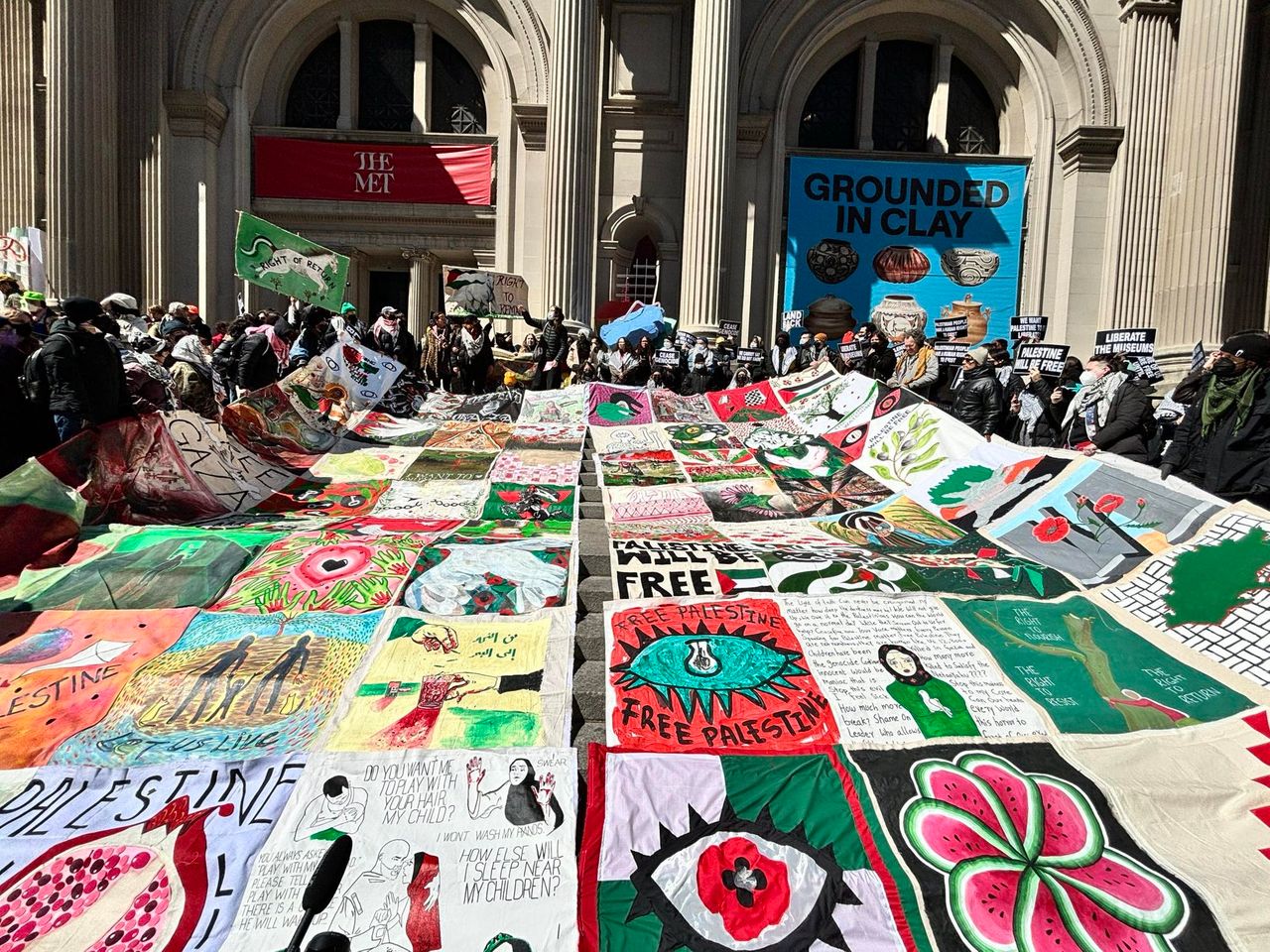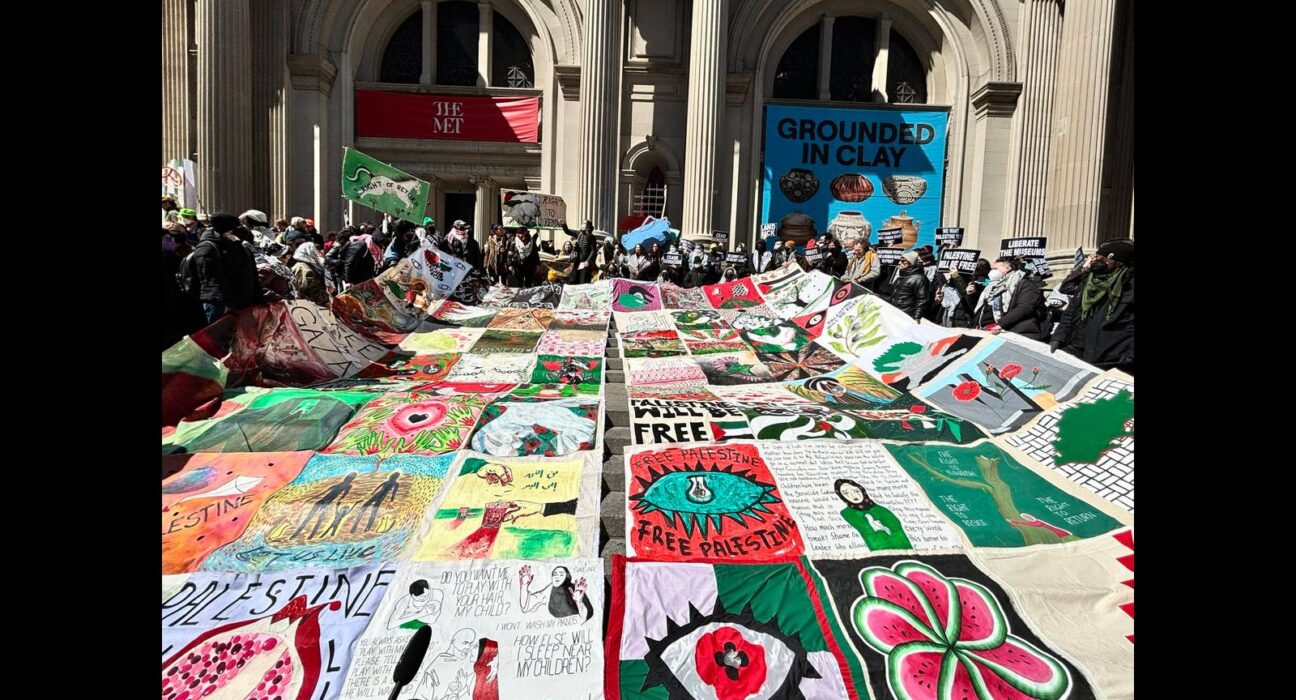Protests by artists and museum workers continue against the Israeli barbarism in Gaza, carried out with the Biden administration’s full complicity, and the silence of leading arts institutions.
The death toll mounts and famine looms for the Palestinian population, alarming and horrifying millions across the globe. Meanwhile, official government spokesmen, in Tel Aviv, Washington, Berlin and elsewhere, hands dripping with blood, hypocritically decry “antisemitism” and “apologies for terrorism.”
Last Sunday, some 350 artists and cultural workers took part in an action outside the main entrance of the Metropolitan Museum of Art (MMA) in New York City. They unfurled a 30-by-50-foot collective quilt—entitled “From Occupation to Liberation”—featuring, according to the Art Newspaper, “sewn, painted and printed designs by more than 60 artists expressing solidarity with Palestinians.”

“The pro-Palestine quilt’s panels, most of which feature the red, green and black of the country’s flag, vary widely in style and tone,” the online publication reported. Sara Erenthal, whose square of the quilt features two crying figures raising their hands in need, told the Art Newspaper that the “images that keep sticking in my mind are of parents holding their children, siblings holding each other—people protecting their loved ones and begging for help. … As a Jewish person it’s important that I lend my voice to this cause.”
ArtNews pointed out that the “vast quilt calling for Palestinian liberation” also “honored the poet Refaat Alareer, who was killed in an airstrike in Gaza this past December.”
The artist-led advocacy group Hope in the Art World explained in a statement that “We ally ourselves in the global movement for a ceasefire and Palestinian liberation and the acknowledgment that the history of Palestinian subjugation is upheld by occupation and U.S. military funding. … We, furthermore, object to the argument of conflating the call for a ceasefire to be a baseless accusation of antisemitism.”
The same group, in a press release, noted that they had organized the protest at the Metropolitan Museum entrance “to make several clear demands: that the publicly funded museum (1) cut ties with board members who profit from the ongoing Israeli bombardment and settler-colonial occupation of Palestine, (2) support an immediate and permanent cease-fire in Gaza and (3) aid in the preservation of Palestinian cultural heritage sites being destroyed and desecrated by Israel.”
Protesters handed out a mock brochure calling on museum visitors to “Dump the Fine Art of Imperialism.” They chanted “Free Palestine” and “Art for Liberation, Not for Colonization.” In its statement, Hope in the Art World inveighs against “an institution whose board members and endowments are heavily invested in the war on Gaza and directly profit from the occupation of Palestine.”
On March 11, 158 staff, fellows, and volunteers at the Metropolitan, calling themselves Met Workers For Palestine, delivered an open letter to Chief Executive Officer Max Hollein urging the institution to take a public stand against the genocide.
The letter observes that since the Hamas raid of October 7, “Israel has imposed massive destruction in Gaza.” In addition to the tens of thousands of civilians killed by the Israel Defense Forces (IDF), “most buildings in Gaza have been destroyed, including precious cultural heritage sites and arts institutions.” More than 100 mosques have been leveled, “including Gaza’s oldest, the Great Omari Mosque. The third oldest church in the world, the Church of St. Porphyrios, was bombed, as was the Hamman al-Sammara, an ancient bathhouse in the historic Jewish Quarter.”
The open letter adds that museums “have also been attacked, including the Rafah Museum, the Rashad El Shawa Cultural Center, and the Al Qarara Cultural Museum which held pieces dating to the Bronze Age. Over 200 Palestinian cultural heritage sites have been destroyed.”
The museum workers recall that the Metropolitan “condemned Russia’s attack on Ukraine [in 2022] and the destruction of Kuindzhi Art Museum” in Mariupol and President Donald Trump’s threats in 2020 “to destroy Iranian cultural heritage sites. … We ask that MMA take that stand again now.”
The letter goes on to urge the museum to take steps “to better attribute and showcase our collection of Palestinian artworks” and to protect “the voices of staff who express horror at the massive loss of life and who lament the destruction of Gaza’s cultural heritage.”
Staff members at the Brooklyn Museum and the Museum of Modern Art in New York have issued similar statements. More than 250 workers at the former institution issued a letter in November that read in part,
Israel has continued its merciless attacks on Gaza even while knowing Israeli hostages are held there, bombing hospitals, a refugee camp, holy sites, and blocking exit routes to effectively trap Palestinians in Gaza. Meanwhile, in the United States, cultural institutions have largely uplifted a narrative of recent events that erases or downplays Palestinian loss, discredits the Palestinian fight for self-determination, and dehumanizes Palestinians. This outlook contradicts the stated values of our institution and those that we personally hold as art workers, writers, and artists.
We refuse to make this issue more complicated than it is: the unrelenting killing of Palestinians must stop with a ceasefire and the occupation of Palestinian land must end.
The Museum of Modern Art workers released an open letter in February, which asserted that
It is imperative our collective statement clearly outlines that Zionism is neither synonymous with nor representative of Judaism, therefore a critique of the violence enacted in the name of Zionist rhetoric is in no way a suggestion of antisemitism. As museum and cultural workers, we condemn the heightened cases of both Islamophobia and antisemitism that have resulted as direct collateral of Israel’s crimes in Gaza.

